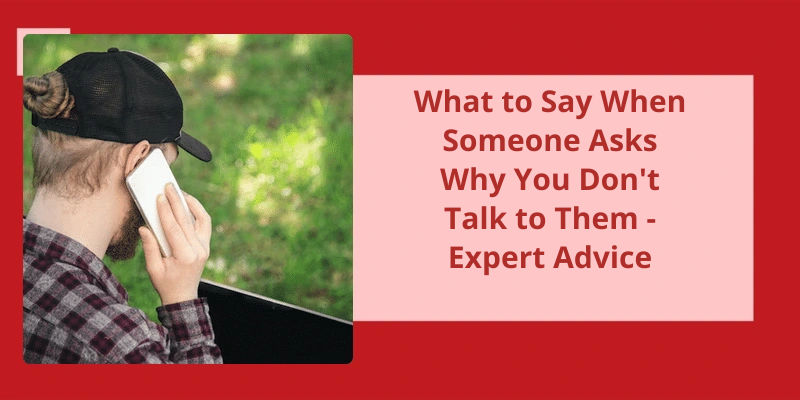When someone asks why you don't talk to them, it can be a difficult situation to navigate. Perhaps you're an introvert who prefers solitude over socializing. Maybe you’ve trust issues or fear of judgement that prevents you from opening up to others easily. Whatever the reason may be, avoiding conversation with someone can be seen as rude or even offensive. It's important to understand that everyone has different communication styles and preferences. Some people may enjoy small talk, while others may prefer deep and meaningful conversations. It's okay to politely decline social interactions if it doesn't align with your personal needs. However, it's also essential to communicate effectively and express your reasons in a clear and respectful manner. Ultimately, it's about finding a healthy balance between self-care and social engagement.
What Do You Reply When Someone Says No?
This can show the person that you’re willing to listen and understand their point of view, even if you don’t necessarily agree with it. It’s important to keep an open mind, and not to dismiss their opinion straight away.
Another approach could be to ask the person what their concerns or reservations are. This can help you understand why they’re saying no, and perhaps address any misunderstandings they may have. You can say something like I appreciate your honesty, can you tell me more about why youre saying no?
It may also be helpful to consider offering alternatives or compromises. For example, if the person is saying no to a specific plan or idea, you can suggest other options that may be more acceptable to them. By doing so, you’re showing the person that you’re willing to work with them and find a solution that works for everyone.
In some cases, it may simply be a matter of timing or circumstance. For example, if the person is busy or stressed, they may not be able to commit to something at that moment. In such situations, it can be helpful to revisit the discussion at a later time, when the person may be more receptive.
Ultimately, how you respond to someone saying no will depend on the situation and the person you’re interacting with. It’s important to approach the conversation with curiosity and empathy, and to avoid becoming defensive or dismissive. By doing so, you can maintain a positive and constructive dialogue, and potentially find a way to move forward that works for everyone involved.
By acknowledging their feelings and showing your understanding, you can create a safe and comfortable environment for the both of you to move forward. In this article, we will discuss some helpful tips on how to respond when someone expresses that they don’t want to talk and navigate the next steps of the conversation. Let’s dive in.
How Do You Respond When Someone Says They Don’t Want to Talk?
It’s important to respect someones boundaries when they say they don’t want to talk. However, depending on the situation, there may be next steps that need to be taken. For example, if the person is avoiding a necessary conversation, it may be helpful to explain why it’s important and ask if theres a better time or place to have it. If the person is struggling with their mental health and needs support, it may be helpful to offer resources or be available to listen when theyre ready.
It’s also important to consider if the person is shutting down because of something youve said or done. If this is the case, it may be helpful to apologize and try to understand their perspective. Encourage them to share their thoughts and feelings without judgment. This can be done by saying something like, “I understand if something I said made you uncomfortable. Im open to hearing your thoughts and working through it together.”
In some cases, the person may simply need space to process their own emotions before being able to talk. It’s important to honor their request for space and let them know that youre available if they need you. Check in with them after a reasonable amount of time has passed to see if theyre ready to talk.
It’s important to remember that everyone experiences difficult conversations differently and may need different support. Avoid pressuring them into talking before theyre ready and respect their choice to not discuss certain topics. It’s also important to take care of your own emotions and boundaries during these situations. Offer support, but don’t take on more than you can handle.
Overall, responding when someone says they don’t want to talk requires empathy, respect, and patience. It’s important to communicate that you understand and respect their boundaries while also offering support and understanding. By doing so, you can help create a safe and supportive environment for difficult conversations.
The ability to strike up a conversation with someone is an essential social skill that can help you connect with people and build lasting relationships. However, it can be challenging to initiate a conversation with someone who doesn’t talk a lot, and it often requires a little more effort and patience. In this article, we’ll explore some practical tips and strategies to help you start a conversation with someone who’s quiet or shy. Let’s dive in!
How to Start a Conversation With Someone Who Doesn T Talk a Lot?
Additionally, try to find common ground between you and the person you’re speaking to. This can be anything from a shared acquaintance, a mutual interest, or even just commenting on the weather. It’s important to find a topic that the other person is interested in talking about so that they feel comfortable continuing the conversation.
Another way to start a conversation with someone who doesn’t talk a lot is to engage them in an activity. This could be something as simple as offering them a drink or inviting them to play a game. Engaging in an activity together can help break the ice and make the person feel more at ease.
It’s also important to be patient when starting a conversation with someone who doesn’t talk a lot. They may be shy or introverted, and it may take some time for them to feel comfortable enough to open up. Try not to take it personally if the other person doesn’t respond immediately or seems distant at first.
One way to keep the conversation going is to ask open-ended questions. These are questions that require more than just a yes or no answer, and they can help the other person open up and share more about themselves. Some examples of open-ended questions include “What do you enjoy doing in your free time?” or “Tell me about a trip you went on that you really enjoyed.”
This means giving the other person your full attention, avoiding interrupting them, and showing empathy and understanding when they do share something with you. By listening actively, you can help the other person feel heard and valued, which can help build trust and encourage them to open up even more.
Tips for Continuing the Conversation if It Stalls
- Ask open-ended questions
- Share a personal story or experience
- Bring up a new topic related to the current conversation
- Ask about their hobbies or interests
- Offer a compliment or positive feedback
- Gauge their opinion on a current event or news story
- Reflect on something they said earlier in the conversation
- Suggest a game or activity to do together
It’s never easy when the person you’re trying to connect with seems unwilling to communicate. Fortunately, patience and understanding can go a long way in helping to ease the tension and create a more comfortable environment for both parties. By giving him space, offering support, and finding mutually convenient times to talk, you may be able to break down the barriers and establish a more meaningful connection over time. But how can you achieve this delicate balance? Read on for some practical tips and guidance.
What to Do When He Doesn T Want to Talk?
Communication is an important part of any relationship, but what do you do when your partner doesn’t want to talk? It can be frustrating, especially if youre the type of person who wants to address any issues as soon as they come up. The first thing you should do is be patient. Sometimes, people need space to process their thoughts and emotions. If your partner needs some time to themselves, try not to take it personally.
In addition to being patient, it’s important to be supportive and understanding. If your partner is going through a difficult time or dealing with a personal issue, they may not be in the right headspace to have a conversation. Instead of pushing them to talk, offer your support and let them know that youre there for them when theyre ready.
Another strategy to communicate with a man that won’t communicate is to ask to schedule a better time to talk. Sometimes, timing is everything. If your partner is feeling overwhelmed or stressed out, they may not be able to communicate effectively. Try to find a time when both of you’re relaxed and comfortable, and approach the conversation with an open mind.
It’s also worth considering whether there may be external factors that are affecting your partners ability to communicate. For example, if theyve just started a new job or are dealing with personal issues, they may not have the energy or bandwidth to engage in deep conversations. Try to be understanding of their situation and offer your support in any way you can.
How to Avoid Communication Breakdowns in a Relationship
Communication breakdowns can harm relationships. To avoid such instances, ensure that you engage in active listening and allow the other person to speak their mind. Clarify any misunderstandings by asking questions and avoid making assumptions. Lastly, validate your partner’s feelings and communicate your own effectively, by being respectful and avoiding using hurtful language.
Conclusion
However, it's important to remember that everyone has their own reasons for the way they interact with others, and there's no one "right" way to communicate. Whether you prefer to keep to yourself or just need some time to build a rapport with someone before opening up, it's crucial to be true to yourself and your needs. Rather than feeling pressured to conform to someone else's expectations or demands, take the time to evaluate your own feelings and communicate them honestly. By being authentic and genuine in your interactions, you'll build stronger connections with those around you and create a more fulfilling social life.






